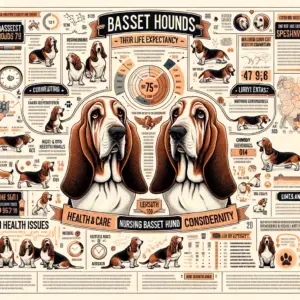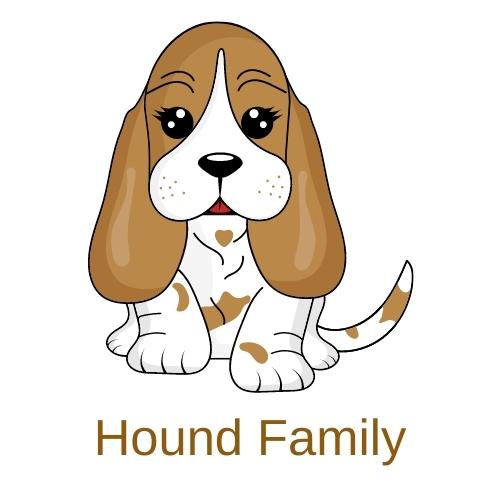Introduction to Basset Hound Lifespan

Welcome to our comprehensive guide on the lifespan of the Basset Hound. In this section, we aim to provide you with a clear understanding of the life expectancy of these lovable dogs and the various factors that can influence it.
-
- Understanding Basset Hound Lifespan
The Basset Hound, with its droopy ears and soulful eyes, is a breed known for its distinctive appearance and friendly nature. But how long do these charming dogs live? On average, a Basset Hound’s lifespan ranges from 10 to 12 years. This is relatively standard for a dog of their size. However, with proper care, regular check-ups, and a healthy lifestyle, some Basset Hounds have been known to live up to 15 years or more. It’s important to note that like all breeds, individual lifespans can vary.
-
- Factors affecting Basset Hound life expectancy
Several factors can influence the lifespan of a Basset Hound. These include genetics, diet, exercise, and overall health care. Basset Hounds are prone to certain health issues such as obesity, ear infections, and hip dysplasia, which can potentially shorten their lifespan. However, with proper management and veterinary care, these conditions can be controlled, allowing your Basset Hound to live a long and happy life.
Understanding your Basset Hound’s lifespan and the factors that can affect it is the first step towards ensuring they live a long, healthy, and fulfilling life. In the following sections, we will delve deeper into Basset Hound health, care, and aging, providing you with the knowledge you need to maximize your furry friend’s lifespan.
Understanding Basset Hound Health
Being a Basset Hound owner comes with its own unique set of responsibilities, especially when it comes to their health. Basset Hounds are known for their long ears and droopy eyes, but they are also known for certain health issues. Understanding these health issues can help you take better care of your Basset Hound and potentially extend their lifespan.
Common Health Issues in Basset Hounds
Let’s delve into the common health issues that Basset Hounds often face:
-
- Overview of health issues in Basset Hounds
Basset Hounds are prone to a number of health issues. These include obesity, ear infections, hip and elbow dysplasia, and gastric torsion. They are also at risk for eye conditions like glaucoma and cherry eye. These issues can be congenital, meaning they are present at birth, or they can develop over time due to the breed’s unique physical characteristics and genetics. [source]
-
- How these health issues can affect Basset Hound lifespan
These health issues can significantly impact the quality and length of a Basset Hound’s life. For instance, obesity can lead to heart disease and joint problems, while ear infections can result in hearing loss if not treated promptly. Hip and elbow dysplasia can cause severe pain and limit mobility, and eye conditions can lead to blindness. Therefore, it’s crucial to monitor your Basset Hound’s health closely and seek veterinary care at the first sign of any health issues. This proactive approach can help extend your Basset Hound’s lifespan and ensure they live a happy, healthy life.
Understanding these health issues is the first step in ensuring your Basset Hound lives a long and healthy life. In the next section, we will discuss preventive measures you can take to mitigate these health risks.
Preventive Measures for Basset Hound Health Issues
As a Basset Hound owner, it is crucial to understand the preventive measures you can take to ensure your dog’s health and longevity. Here are three key strategies:
-
- Regular Veterinary Check-ups
Regular visits to the vet are essential in maintaining your Basset Hound’s health. These check-ups allow for early detection of potential health issues, ensuring that your dog gets the necessary treatment promptly. The veterinarian will conduct a thorough physical examination, assess your dog’s weight, check for parasites, and administer necessary vaccinations. It’s recommended to have at least one veterinary visit per year for adult dogs, and more frequent visits for puppies and senior dogs.
-
- Proper Diet and Exercise
A balanced diet and regular exercise are vital for your Basset Hound’s health. Basset Hounds are prone to obesity, which can lead to serious health issues like heart disease and arthritis. Therefore, feeding them a nutritious, portion-controlled diet and ensuring they get regular, moderate exercise can help maintain a healthy weight and overall good health. Remember, every dog is unique, so it’s best to consult with your vet for personalized diet and exercise recommendations.
-
- Importance of Vaccinations and Preventive Medications
Vaccinations are a critical part of your Basset Hound’s health care routine. They protect your dog from various diseases like rabies, distemper, and parvovirus. Additionally, preventive medications for heartworm, fleas, and ticks are essential to keep your dog safe from these common parasites. Always consult with your vet about the appropriate vaccination schedule and preventive medications for your Basset Hound.
By following these preventive measures, you can significantly contribute to your Basset Hound’s health and longevity. Remember, a healthy dog is a happy dog!
Basset Hound Care
When it comes to caring for your Basset Hound, there are a few key areas to focus on. This section will provide insights into how to care for a young Basset Hound, focusing on proper nutrition for growth and the importance of socialization and training.
Caring for a Young Basset Hound
Young Basset Hounds require special attention in two main areas: nutrition and socialization. Let’s delve into these aspects.
- Proper nutrition for growth: Basset Hounds are known for their rapid growth during the first year, which means they require a diet rich in nutrients. Puppies should be fed high-quality puppy food that is rich in protein and fat to support their growth. It’s also important to feed them small, frequent meals to prevent bloating, a common issue in this breed. Wikipedia provides comprehensive information on the dietary needs of Basset Hounds.
- Importance of socialization and training: Basset Hounds are naturally sociable and friendly dogs. However, early socialization is crucial to ensure they grow up to be well-rounded dogs. Introduce your Basset Hound puppy to a variety of people, environments, and other animals to help them become more comfortable in different situations. Training should also start early, using positive reinforcement techniques. Remember, Basset Hounds can be stubborn, so patience is key.
In conclusion, caring for a young Basset Hound requires a balanced approach, focusing on both their physical and emotional needs. By providing proper nutrition and early socialization, you can ensure your Basset Hound grows up to be a healthy and well-adjusted dog.
Caring for an Elderly Basset Hound
As your Basset Hound enters its golden years, it’s crucial to make some adjustments in its lifestyle to ensure it remains healthy and comfortable. This involves changes in diet and exercise, as well as some special considerations for elderly Basset Hound care.
- Adjustments in Diet and Exercise
As Basset Hounds age, their metabolism slows down, and they become less active. This means that they don’t need as many calories as they did when they were younger. Therefore, it’s important to adjust their diet to prevent obesity, which can lead to various health issues like heart disease and arthritis. A diet rich in high-quality protein and low in fat is ideal for elderly Basset Hounds. You can also consider adding supplements like glucosamine and chondroitin to support joint health.
While elderly Basset Hounds may not have the same energy levels as their younger counterparts, they still need regular exercise to maintain a healthy weight and keep their joints flexible. However, the intensity and duration of the exercise should be reduced. Short, gentle walks are more suitable for older Basset Hounds.
- Special Considerations for Elderly Basset Hound Care
Elderly Basset Hounds may develop age-related health issues such as arthritis, dental disease, and vision loss. Regular vet check-ups are crucial to detect these issues early and start treatment promptly. It’s also important to keep an eye on your Basset Hound’s behavior and physical condition. Any sudden changes could be a sign of health problems and should be addressed immediately.
Comfort is another important aspect of elderly Basset Hound care. As they age, Basset Hounds may have difficulty getting around, especially if they suffer from arthritis. Providing them with a comfortable bed and making sure they can easily access food, water, and their favorite spots in the house can greatly improve their quality of life.
Remember, every Basset Hound is unique, and what works for one may not work for another. It’s always best to consult with your vet to create a personalized care plan for your elderly Basset Hound.
Basset Hound Aging
As your Basset Hound grows older, it’s essential to understand and recognize the signs of aging. This will help you provide the best possible care for your furry friend during their golden years.
Signs of Aging in Basset Hounds
There are two main categories of changes that you might notice as your Basset Hound ages: physical and behavioral.
- Physical changes: As Basset Hounds age, they may experience a variety of physical changes. These can include graying hair, particularly around the muzzle and eyes, a decrease in muscle tone, and an increase in body fat. Their eyes may appear cloudier due to the natural aging process, and they may move more slowly or have difficulty with stairs and jumping. Dental issues can also become more prevalent, so it’s important to keep up with regular vet check-ups.
- Behavioral changes: Aging can also affect a Basset Hound’s behavior. They may sleep more, be less interested in play, and show signs of confusion or disorientation. Changes in appetite and water consumption are also common. It’s important to note that while these changes can be a normal part of aging, they can also indicate underlying health issues, so any significant changes should be discussed with your vet.
Remember, every dog ages differently, and these changes may appear gradually over time. Regular vet check-ups and a healthy lifestyle can help ensure your Basset Hound stays comfortable and happy in their old age.
Supporting an Aging Basset Hound
As your Basset Hound enters its golden years, it’s crucial to provide the right support to ensure its health and happiness. This support can be divided into two main areas: modifications in the care routine and medical support.
- Modifications in Care Routine
As your Basset Hound ages, its needs and abilities will change. It’s important to adapt your care routine to accommodate these changes. Here are some modifications you can consider:
- Diet: Older dogs may require a diet lower in calories but higher in fiber. This helps maintain a healthy weight and supports digestion.
- Exercise: While Basset Hounds still need regular exercise as they age, the intensity and duration may need to be reduced. Short, gentle walks can be beneficial.
- Grooming: Regular grooming becomes even more important as your dog ages. Regular brushing helps prevent skin conditions and keeps the coat healthy.
- Comfort: Consider providing orthopedic beds or ramps to help your aging Basset Hound navigate your home comfortably.
- Medical Support for Aging Basset Hounds
As Basset Hounds age, they may become more prone to certain health issues. Regular veterinary check-ups are crucial to detect any potential problems early. Here are some common medical supports for aging Basset Hounds:
- Regular Check-ups: Regular veterinary check-ups can help detect health issues early. Your vet can provide personalized advice based on your dog’s health status.
- Medication: Older dogs may require medication for age-related conditions such as arthritis or heart disease. Always follow your vet’s advice regarding medication.
- Dental Care: Dental health is often overlooked but is crucial for your dog’s overall health. Regular dental check-ups and cleanings can prevent dental disease.
- Vaccinations: Keeping up-to-date with vaccinations is important to protect your dog from diseases.
Remember, every Basset Hound is unique and may age differently. Always consult with your vet to determine the best care routine for your aging Basset Hound.
Case Study: Basset Hound Longevity
When it comes to understanding the lifespan of a Basset Hound, real-life examples can be incredibly insightful. Let’s delve into a case study of a Basset Hound who lived longer than the average lifespan of this breed.
-
- Case study of a Basset Hound with above average lifespan
Meet Daisy, a Basset Hound who lived to be 16 years old, significantly surpassing the average lifespan of 10-12 years for her breed. Daisy was a beloved pet who lived in a loving home environment. Her owners were diligent about her health and wellness, ensuring she received regular vet check-ups, a balanced diet, and plenty of exercise.
-
- Factors contributing to this Basset Hound’s longevity
Several factors contributed to Daisy’s long and healthy life. Here are a few key elements:
-
- Regular Vet Check-ups: Daisy’s owners ensured she had regular vet visits to monitor her health and catch any potential issues early.
- Healthy Diet: Daisy was fed a balanced diet that was appropriate for her size, age, and health condition. This included high-quality dog food and occasional healthy treats.
- Exercise: Despite the Basset Hound’s reputation for being a bit lazy, Daisy was encouraged to exercise regularly. This helped maintain her weight and overall health.
- Love and Attention: Daisy received plenty of love and attention from her family. This emotional wellbeing can contribute to a dog’s overall health and longevity.
In conclusion, while genetics do play a role in a Basset Hound’s lifespan, factors such as regular vet care, a balanced diet, exercise, and a loving home environment can significantly contribute to their longevity. Daisy’s story is a testament to the impact of these factors.
For more information about Basset Hounds and their lifespan, visit the Basset Hound Wikipedia page.
Conclusion: Maximizing Your Basset Hound’s Lifespan
As we wrap up our discussion on Basset Hound lifespan, let’s revisit the key points that can help you ensure a long, healthy life for your beloved pet. We’ve covered a lot of ground, from understanding the breed’s health to the specifics of their care and aging process. Now, let’s summarize the most important takeaways and share some final thoughts on Basset Hound lifespan.
-
- Key takeaways for Basset Hound care and health
Proper care and health management are crucial to maximize your Basset Hound’s lifespan. Regular exercise, a balanced diet, and routine vet check-ups are the pillars of a healthy life for your dog. It’s also important to be aware of the common health issues in Basset Hounds, such as obesity, ear infections, and hip dysplasia. Early detection and treatment can significantly improve your pet’s quality of life. Learn more about Basset Hound health here.
-
- Final thoughts on Basset Hound lifespan
While the average lifespan of a Basset Hound is 10-12 years, many factors can influence this. Genetics, lifestyle, and overall health care play a significant role in determining how long your Basset Hound will live. By providing the best care possible and staying vigilant about their health, you can help your Basset Hound live a long and happy life. Remember, every dog is unique, and with love and care, they can often surpass their breed’s average lifespan.
In conclusion, owning a Basset Hound is a rewarding experience. They are loyal, friendly, and make great companions. By understanding their specific needs and providing them with the best care, you can ensure they live a long, healthy, and happy life. Here’s to many wonderful years with your Basset Hound!








